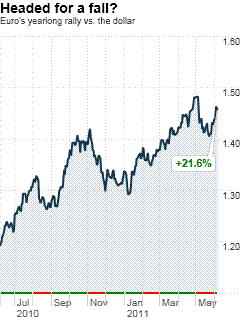匯率趕底大戰(zhàn):歐元能否趕上美元

有人想重頭再來嗎?
|
????美元起步不錯,過去一年美元兌一籃子主要貿(mào)易伙伴國的貨幣匯率下跌16%。但身處美國之外的人們并不是沒有看到貨幣貶值帶來的好處——出口商品價格更低,用貶值貨幣償債導(dǎo)致負債壓力減輕,同時有大把機會可以將自己的麻煩歸咎于倒霉的央行官員。 ????Eurogroup主席讓-克洛德?容克周一下午表示,歐元“相比其他主要參考貨幣客觀高估。”這番評論出現(xiàn)在希臘債務(wù)危機隨時可能爆發(fā)之際,但歐元兌美元——過去一年上漲22%(見右圖)——仍接近52周高點1.47美元。 ????容克是在法國斯特拉斯堡作出上述評論的,當(dāng)時他和另外一位歐洲高官奧利?瑞恩試圖證明希臘問題不一定會導(dǎo)致金融危機。 ????如果說希臘沉重不堪的債務(wù)負擔(dān)屬于急癥,那么歐元就是陳年舊病了。以歐元為紐帶連結(jié)起來的國家財政狀況參差不齊,財力薄弱的國家除了大幅減薪外別無良策來增強競爭力。 ????這一弊病是將希臘、葡萄牙置于與德國、法國同一貨幣聯(lián)盟后的惡果。歐元匯率越高,弱國感受到的痛就越深切。容克建議,未來官員們在對這個明顯兩極化的聯(lián)盟進行改革時,必須考慮這個問題。 ????“歐盟理事會有同行認為歐元區(qū)應(yīng)該引入?yún)R率政策,”他說,“我非常贊同這一觀點。因為從長遠來看,在一個結(jié)構(gòu)性的全球化世界中,一個連匯率政策構(gòu)想都沒有的經(jīng)濟貨幣組織不會有什么前途。” ????即便是這樣一位著名官員呼吁歐元貶值,但目前并不清楚市場是否會迅速應(yīng)這種呼吁。糟糕數(shù)據(jù)迭出,經(jīng)濟學(xué)家們稱美國數(shù)據(jù)已進入“疲弱期”,認為這種狀況將很快結(jié)束的人寥寥無幾。 ????只要美國經(jīng)濟依然疲弱,美聯(lián)儲(Federal Reserve)繼續(xù)維持接近于零的利率水平,資金就可能繼續(xù)流入利率較高的歐洲,而且歐洲央行(European Central Bank)已表示不久將進一步收緊政策。 ????此外,雖然歐洲在應(yīng)對希臘危機方面乏善可陳,但美國決策者們面臨的問題確實嚴峻,同時,他們未能協(xié)調(diào)一致,有效應(yīng)對。這同樣可能導(dǎo)致資金繼續(xù)流出美元。 ????美國銀行(Bank of America)的經(jīng)濟學(xué)家伊森?哈里斯周一在致客戶的一份報告中寫道: ????盡管房地產(chǎn)市場持續(xù)低迷,但就如何化解這場危機卻缺乏認真深入的討論。盡管失業(yè)率高達9%,但就如何加快就業(yè)市場復(fù)蘇也沒有認真深入的討論。盡管經(jīng)濟疲弱跡象清晰,但要求快速收緊貨幣和財政政策的壓力卻絲毫未減。美國需要設(shè)定一條清晰的路徑,實現(xiàn)可持續(xù)性負債,但收緊時機應(yīng)由復(fù)蘇力度決定。 ????當(dāng)然,國會就是國會,其未來動向充滿了不確定性。只要希臘危機不爆發(fā),美元在趕底過程中就不太可能丟掉領(lǐng)先地位。 |
????The dollar has a nice head start, having dropped 16% over the past year against a basket of major U.S. trading partners. But the benefits of a weaker currency – cheaper exports, the ability to stick it to your creditors by repaying them with less valuable paper, abundant opportunity to blame your problems on hapless central bankers – aren't lost on people outside this country. ????The euro is "objectively overvalued in comparison with other major reference currencies," Eurogroup chairman Jean-Claude Juncker said Monday afternoon. The comment comes as the euro, up 22% against the dollar over the past year (see chart, right), trades near a 52-week high at $1.47 even as the Greek debt crisis threatens to erupt. ????Juncker made the remarks in Strasbourg, France, as he and another top European official, Olli Rehn, tried to make the case that the Greek mess needn't lead to a financial crisis. ????But if Greece's unbearable debt burden is the acute problem, the chronic one is the currency that ties together financially weak and strong states without giving the weaker ones any recourse to improving their competitive positions, short of sharp wage cuts. ????That is a problem in putting Greece and Portugal in the same currency union as Germany and France at any rate, but the higher the euro exchange rate go the more intense the pain gets in the weaker states. Juncker suggested officials will have to consider this as they adopt reforms to what is obviously a broken union. ????"There are colleagues in the European Council who think that the euro zone should have an exchange rate policy," he said. "I'm more inclined to think that we should have an exchange rate policy because in a structurally globalized world an economic and monetary unit which doesn't even have a vision of an exchange rate policy isn't really in the long run going to have a satisfactory profile." ????Yet even with a prominent official calling for a weaker euro, it's far from clear that markets will be in any hurry to comply. A run of weak numbers has economists referring as one to the "soft patch" in U.S. data, and few expect it to end any time soon. ????As long as the U.S. economy wheezes and the Federal Reserve keeps interest rates near zero, money is likely to keep flowing to Europe, where rates are higher and the European Central Bank has signaled it intends to further tighten policy soon. ????What's more, while Europe obviously isn't exactly setting any records in responding decisively to the Greek crisis, it's hard to overstate the scale of problems facing U.S. policymakers – or their failure to devise something approaching a coherent response. This too is apt to keep funds flowing away from the dollar. ????As Bank of America economist Ethan Harris writes in a note to clients Monday: ????Despite the ongoing recession in the housing market, there is no serious discussion about how to resolve the crisis. Despite a 9% unemployment rate, there is no serious discussion about how to speed up the job market recovery. And despite clear signs of economic weakness, there is no let-up in the pressure for quick monetary and fiscal tightening. The U.S. needs to set a clear path to debt sustainability, but the timing of tightening should be dictated by the strength of the recovery. ????Of course, Congress being Congress, what should happen is anything but a sure thing. As long as the Greek crisis stays on the back burner, the dollar looks unlikely to give up its lead spot in the race lower. |
?













